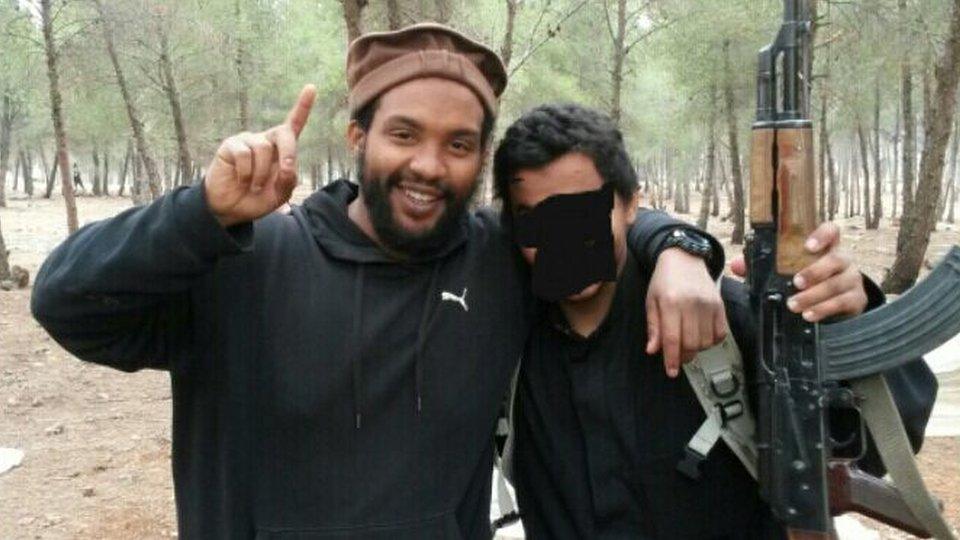Who were the jihadists nicknamed the Islamic State 'Beatles'?
- Published
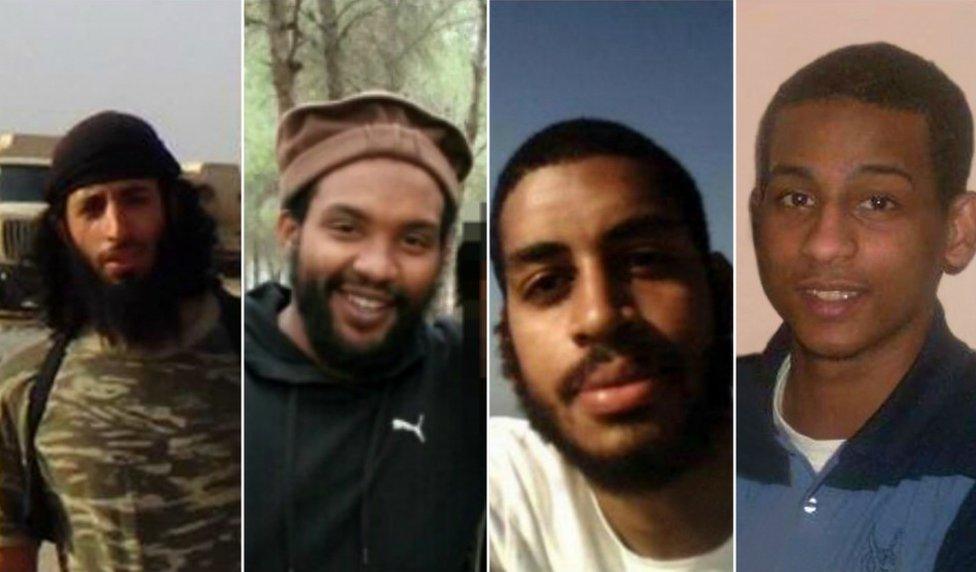
Mohammed Emwazi, Aine Davis, Alexanda Kotey and El Shafee Elsheikh (l to r)
A man who was alleged to have been part of an Islamic State group known as the Beatles has been charged and remanded in custody in the UK.
Aine Davis, from west London, had just returned from Turkey, where he had served seven and a half years for terrorism offences.
He has been charged with offences related to funding terrorism.
Members of the group, known as the Beatles because of their British accents, murdered hostages while fighting with the IS in Syria.
Davis denied being a member of the group.
What were the IS 'Beatles' responsible for?
The four members who are said to be part of the group all grew up in west London and volunteered to fight for the Islamic State group in Syria.
They ended up guarding Western hostages.
US authorities say the group beheaded 27 hostages. Videos of the murders were sent around the world, causing outrage.
Hostages also recall the group torturing with electric shocks, waterboarding and mock executions.
They were "thugs with no knowledge of what is religion at all", Spanish journalist and former hostage Javier Espinosa told BBC News, in 2017.
Who were the members of the IS cell?
Three are still living - Aine Davis, Alexanda Kotey, El Shafee Elsheikh.
Mohammed Emwazi, who was nicknamed Jihadi John, was killed in Syria, in 2015.
Aine Davis
Davis, who lived in Hammersmith, had a number of drug convictions and was jailed in 2006 for possessing a firearm.
After converting to Islam, Davis changed his name to Hamza and met Emwazi. The two were part of a group that radicalised Muslims living in London. Davis left the UK to join IS in 2013.
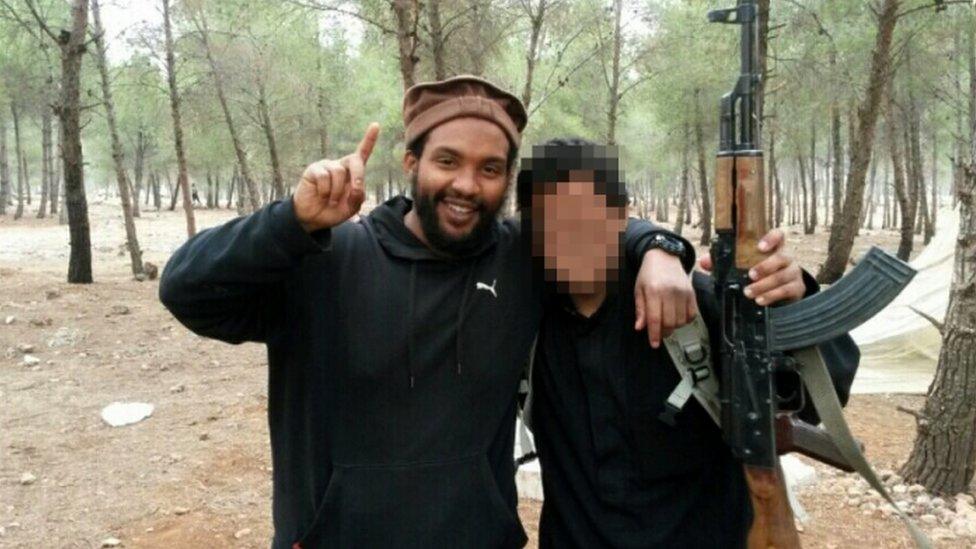
Davis was jailed for seven and a half years in Turkey
Davis was arrested near Istanbul in 2015 and in 2017 he was convicted by a Turkish court of being a senior member of a terrorist organisation.
At his trial in Turkey, Davis admitted knowing Mohammed Emwazi from praying in the same mosque in west London, but denied being his friend, or a member of the "IS Beatles" group.
He served seven and a half years in prison.
Arriving back in Britain at Luton Airport in August 2022, Davis was arrested by counter-terrorism officers from the Met Police and charged with offences including possession of a firearm for a purpose connected with terrorism, and charges related to funding terrorism.
Alexanda Kotey
Alexanda Kotey was sentenced in April 2022 to life imprisonment in the US, having pleaded guilty to eight criminal charges including lethal hostage-taking and conspiracy to support terrorists.
He admitted involvement in the deaths of four Americans - journalists James Foley and Steven Sotloff and aid workers Kayla Mueller and Peter Kassig.
Sentencing him, the judge described his actions as "egregious, violent and inhumane".
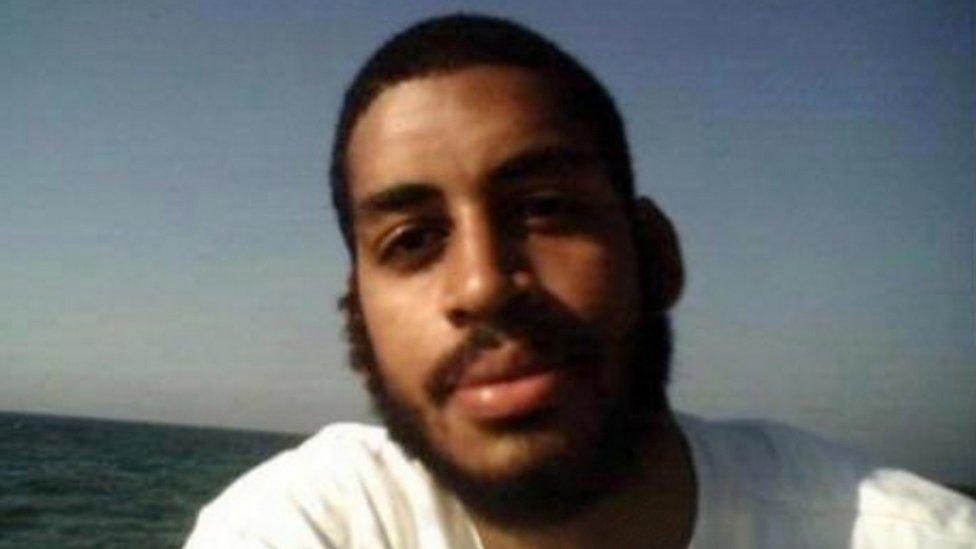
Kotey was one of two men reportedly "unmasked" by media reports in 2016
These offences carry the death penalty - but US authorities have told Britain they will not execute Kotey, who is 38.
Instead, he faces life imprisonment. He has been stripped of his British citizenship.
Living in west London, Kotey - who is of Ghanaian and Greek Cypriot background - had attended the al-Manaar mosque with Mohammed Emwazi.
He was captured in Syria by Kurdish forces, alongside El Shafee Elsheikh.
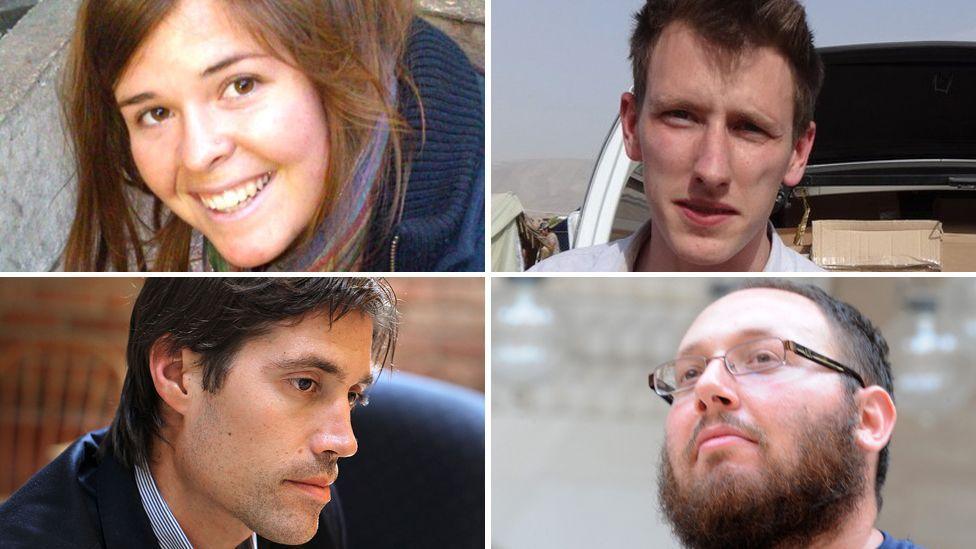
Clockwise from top left: Aid workers Kayla Mueller and Peter Kassig, and journalists Steven Sotloff and James Foley
The cell is also blamed for the deaths of British aid workers David Haines and Alan Henning, and Japanese journalists Haruna Yukawa and Kenji Goto.
El Shafee Elsheikh
The son of Sudanese refugees who came to Britain, Elsheikh, went to Syria in 2012 and joined al-Qaeda before signing up with IS.
Hostages called him Jihadi George and say as the main guard, he carried out most of the torture.
Elsheikh was captured by the Kurdish-led Syrian Democratic Forces, in January 2018, as they overran the last pieces of IS-controlled territory in Syria.
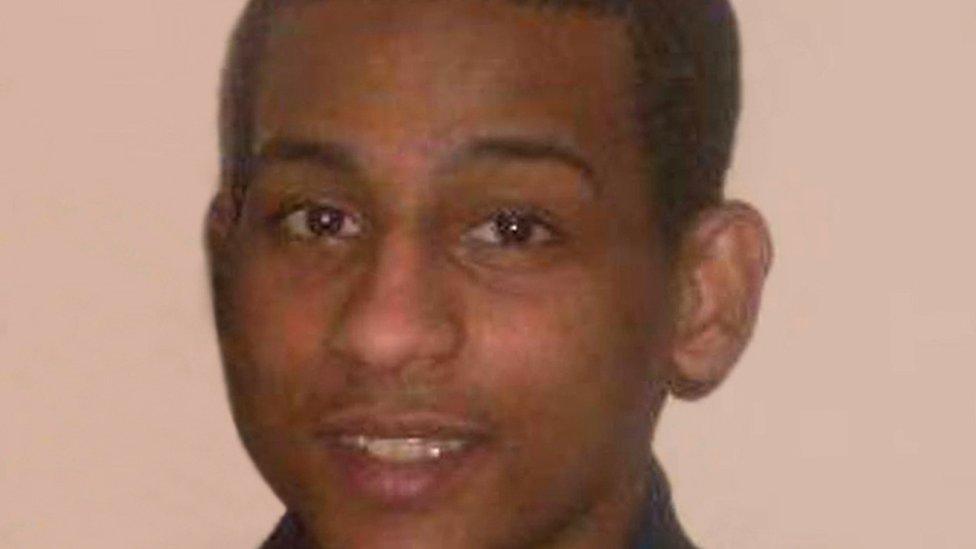
El Shafee Elsheikh is said to have earned a reputation for "waterboarding, mock executions and crucifixions"
He was found guilty of lethal hostage taking and conspiracy to commit murder.
He was stripped of his British citizenship in 2018.
Mohammed Emwazi
Emwazi, dubbed Jihadi John, fronted a number of videos showing executed hostages.
Born in Kuwait, his family moved to the UK when he was six years old, in 1988. He studied computer programming at the University of Westminster, graduating in 2009.
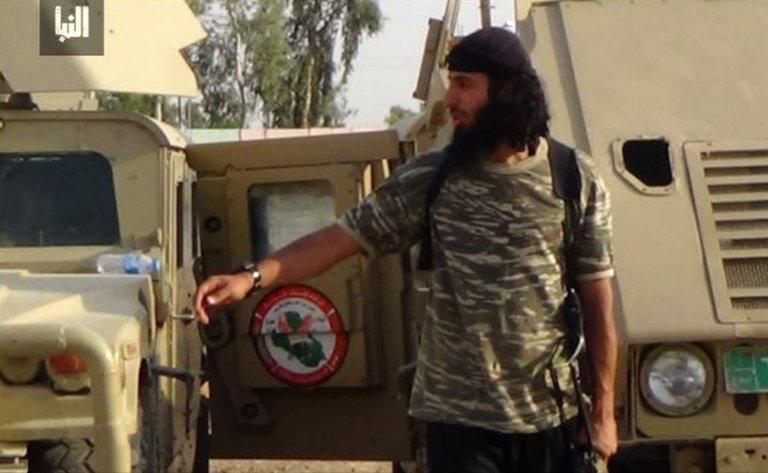
Emwazi, thought to be the group's ringleader, was killed after an intensive manhunt in 2015
Throughout 2014, Emwazi was shown, with his face disguised, in a number of videos where Western hostages appeared to be beheaded.
A top target for intelligence services, he was killed in a joint US-British drone strike in Syria, in November 2015.
Related topics
- Published9 February 2018
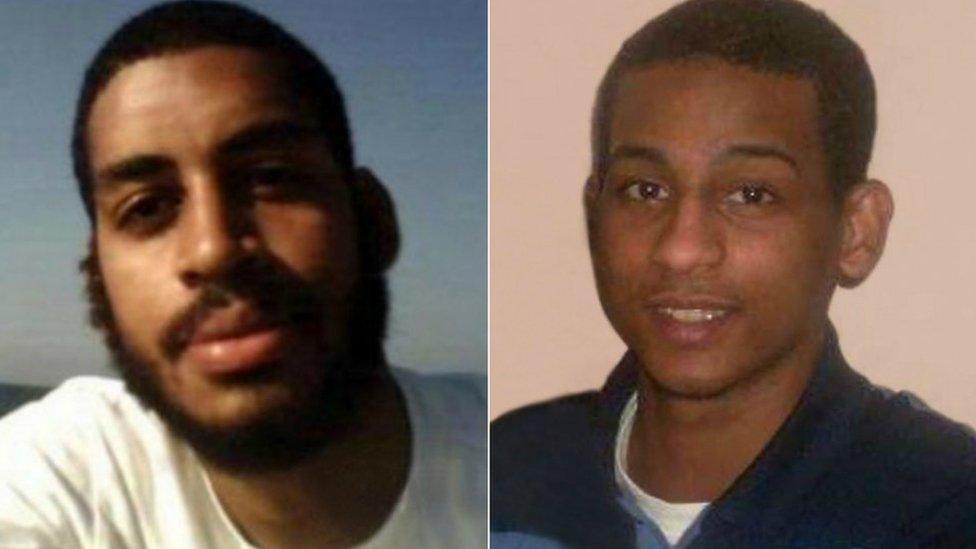
- Published8 February 2018
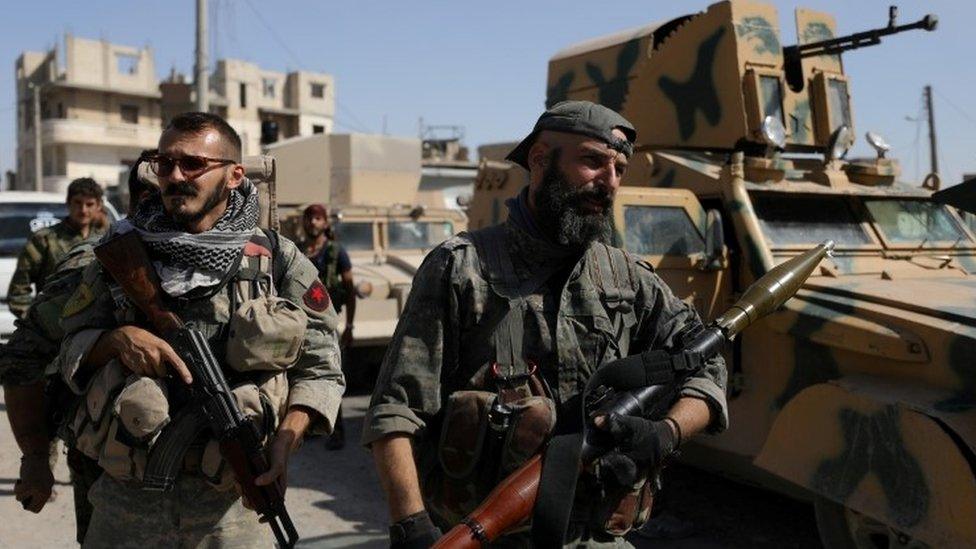
- Published11 August 2022
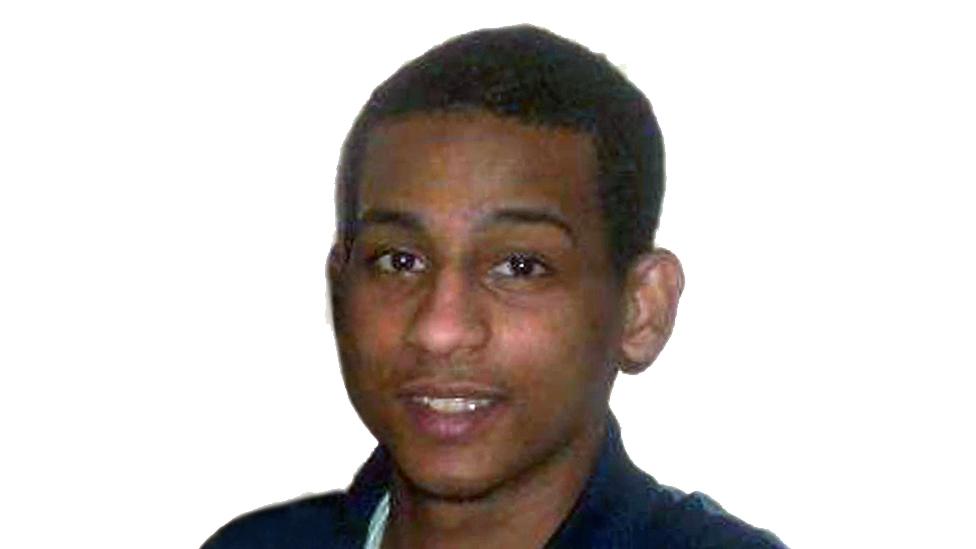
- Published9 May 2017
